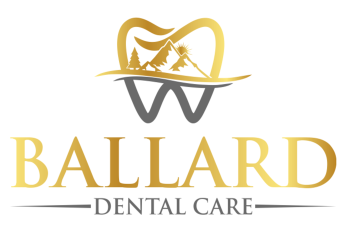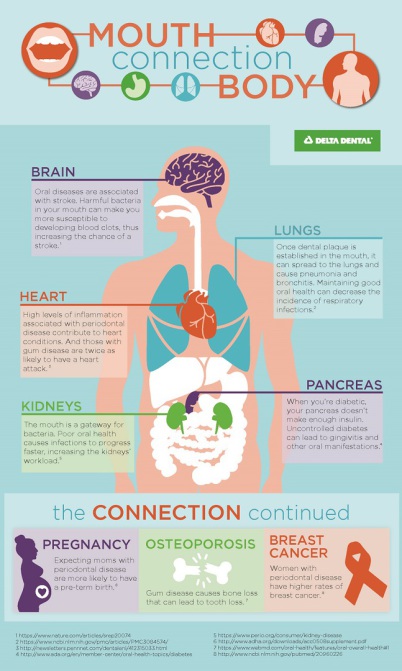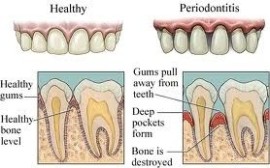Why is gum disease so serious?
Recent research reveals that gum disease is linked to increased risk for major overall health problems, including but not limited to stroke, heart disease, respiratory problems, osteoporosis, diabetes complications, low birth weight and most recently, dementia. Because of these findings, research continues. We may learn much more in the next few years.
It makes perfect sense, though - gum disease linked to overal health problems. Everything that enters or is present in the mouth has access to the whole body. The mouth is like a portal to the body. That's why regular checkups and hygiene visits are vital to not only oral health but also overal health.
Gum Disease: Your Gums' Worst Enemy
A healthy smile is a beautiful smile!
Perio Truths
- Gum Disease is a silent disease - you can have it and not even know it.
- Several factors contribute to periodontal disease: plaque buildup, heredity, and lifestyle choices.
- If you have gum disease, you can brush and floss all you want, but it will not go away until a dentist or hygienist removes the bacteria from under the gum line.
When you eliminate gum disease you lower your risk for heart disease and other health problems.
Diagnosis
Periodontal disease is diagnosed by your dentist or dental hygienist during a periodontal examination. This type of exam should always be part of your regular dental check-up.
A periodontal probe (small dental instrument) is gently used to measure the sulcus (pocket or space) between the tooth and the gums. The depth of a healthy sulcus measures three millimeters or less and does not bleed. The periodontal probe helps indicate if pockets are deeper than three millimeters. As periodontal disease progresses, the pockets usually get deeper.
Your dentist or hygienist will use pocket depths, amount of bleeding, inflammation, tooth mobility, etc., to make a diagnosis that will fall into a category below:
Gingivitis:
- Gingivitis is the first stage of periodontal disease. Plaque and its toxin by-products irritate the gums, making them tender, inflamed, and likely to bleed.
Periodontitis:
- Plaque hardens into calculus (tartar). As calculus and plaque continue to build up, the gums begin to recede from the teeth. Deeper pockets form between the gums and teeth and become filled with bacteria and pus. The gums become very irritated, inflamed, and bleed easily.Slight to moderate bone loss may be present.
Advanced Periodontitis:
- The teeth lose more support as the gums, bone, and periodontal ligament continue to be destroyed. Unless treated, the affected teeth will become very loose and may be lost. Generalized moderate to severe bone loss may be present.
Procedure
Periodontal treatment methods depend upon the type and severity of the disease. Your dentist and dental hygienist will evaluate for periodontal disease and recommend the appropriate treatment.
Periodontal disease progresses as the sulcus (pocket or space) between the tooth and gums gets filled with bacteria, plaque, and tartar, causing irritation to the surrounding tissues. When these irritants remain in the pocket space, they can cause damage to the gums and eventually, the bone that supports the teeth!
If the disease is caught in the early stages of gingivitis, and no damage has been done, one to two regular cleanings will be recommended. You will also be given instructions on improving your daily oral hygiene habits and having regular dental cleanings.
If the disease has progressed to more advanced stages, a special periodontal cleaning called Scaling and Root Planning (deep cleaning) will be recommended. It is usually done one quadrant of the mouth at a time while the area is numb. In this procedure, tartar, plaque, and toxins are removed from above and below the gum line (scaling) and rough spots on root surfaces are made smooth (planning). This procedure helps gum tissue to heal and pockets to shrink. Medications, special medicated mouth rinses, and an electric tooth brush may be recommended to help control infection and healing.
If the pockets do not heal after scaling and root planning, periodontal surgery may be needed to reduce pocket depths, making teeth easier to clean. Dr. Cole or Dr. Chasen may also recommend that you see a Periodontist (specialist of the gums and supporting bone).
Periodontal Maintenance vs. "Just a cleaning"
"Just a cleaning" or prophy is a procedure that involves the cleaning of your teeth from primarily your gums and up. It may involve all hand scaling or a combination of hand scaling and ultrasonic scaling followed by a polishing with a fine paste.
When a patient has been through Scaling and Root Planings due to the presence of gum disease, the patient is placed on a more frequent recall, usually 3 months apart. These types of cleanings are called Periodontal Maintenance. To inhibit the periodontal diseases growth and or spread, periodontal maintenance provides a less invasive technique in its management.
Once you are diagnosed with periodontal disease, management is key to success. Those with the disease are more prone to relapse back into the disease if scheduled visits are not made.
These visits are more involved than a routine prophy appointment.
Your smile is an investment for a lifetime!
The greatest compliment our patients can give is the referral of their friends and loved ones.
Refer a friend or family member to us and be sure they mention your name on their paperwork so that we can personally thank you. We'll also send you a $25 gift card to show our appreciation after their new patient exam, x-rays and cleaning.





